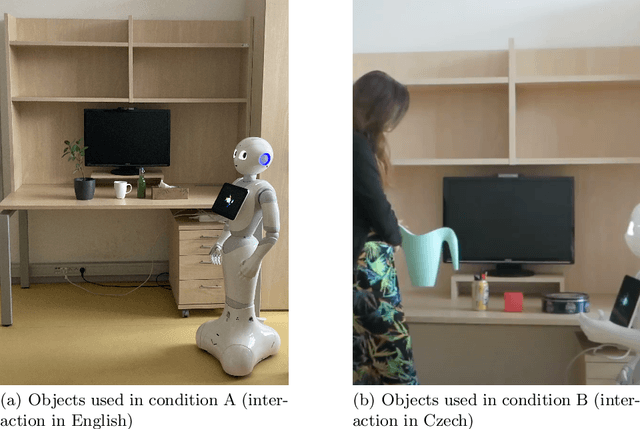Barbara Sienkiewicz
Robots and Social Sustainability
Jan 07, 2024Abstract:Sustainability is no longer a matter of choice but is invariably linked to the survival of the entire ecosystem of our planet Earth. As robotics technology is growing at an exponential rate, it is crucial to examine its implications for sustainability. Our focus is on social sustainability, specifically analyzing the role of robotics technology in this domain by identifying six distinct ways robots influence social sustainability.
Is a humorous robot more trustworthy?
Oct 24, 2023



Abstract:As more and more social robots are being used for collaborative activities with humans, it is crucial to investigate mechanisms to facilitate trust in the human-robot interaction. One such mechanism is humour: it has been shown to increase creativity and productivity in human-human interaction, which has an indirect influence on trust. In this study, we investigate if humour can increase trust in human-robot interaction. We conducted a between-subjects experiment with 40 participants to see if the participants are more likely to accept the robot's suggestion in the Three-card Monte game, as a trust check task. Though we were unable to find a significant effect of humour, we discuss the effect of possible confounding variables, and also report some interesting qualitative observations from our study: for instance, the participants interacted effectively with the robot as a team member, regardless of the humour or no-humour condition.
How language of interaction affects the user perception of a robot
Oct 23, 2023



Abstract:Spoken language is the most natural way for a human to communicate with a robot. It may seem intuitive that a robot should communicate with users in their native language. However, it is not clear if a user's perception of a robot is affected by the language of interaction. We investigated this question by conducting a study with twenty-three native Czech participants who were also fluent in English. The participants were tasked with instructing the Pepper robot on where to place objects on a shelf. The robot was controlled remotely using the Wizard-of-Oz technique. We collected data through questionnaires, video recordings, and a post-experiment feedback session. The results of our experiment show that people perceive an English-speaking robot as more intelligent than a Czech-speaking robot (z = 18.00, p-value = 0.02). This finding highlights the influence of language on human-robot interaction. Furthermore, we discuss the feedback obtained from the participants via the post-experiment sessions and its implications for HRI design.
 Add to Chrome
Add to Chrome Add to Firefox
Add to Firefox Add to Edge
Add to Edge